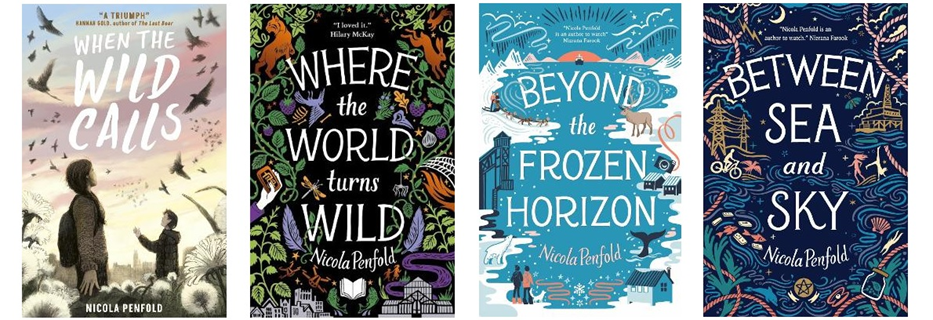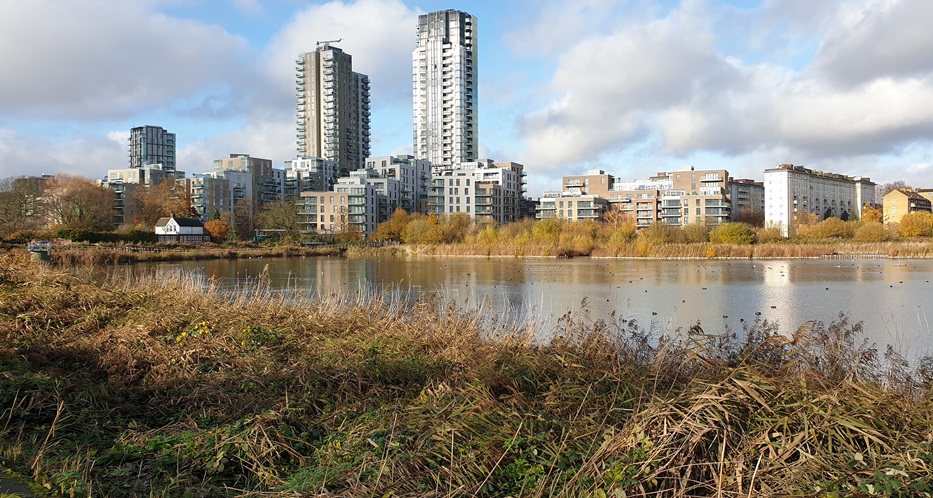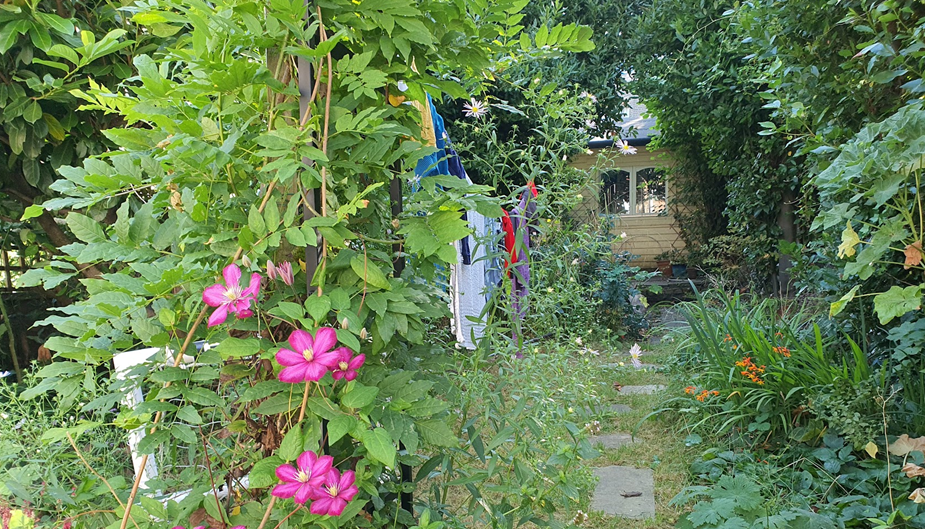Nicola Penfold


About Author
In her books Where the World Turns Wild and its follow-up, When the Wild Calls, Nicola Penfold explores how climate change might affect our future world, and how societies can adapt to the challenges they face.
Nicola was born in Merseyside and grew up in Doncaster, studied English at Cambridge and then completed a Computing Science masters at Imperial College London before turning her hand to writing. Her debut, Where the World Turns Wild, was shortlisted for the first Joan Aiken Future Classics Prize in 2017 and selected for SCBWI's 2018 Undiscovered Voices anthology.
Nicola lives with her husband, four children and two cats in North London, and escapes when she can to wilder corners of the UK for adventures. Find Nicola online: Twitter: @nicolapenfold, Instagram: @nicolapenfoldauthor, and Facebook: Nicola Penfold Author
Interview
When the Wild Calls (Little Tiger)
April 2024
Author Nicola Penfold returns to her stunning dystopian ecological adventure, Where the World Turns Wild, with a new journey for Juniper and Bear, When the Wild Calls, in which they revisit the city to save their grandmother and friend Etienne. In her sequel, Nicola Penfold explores questions around re-wilding our cities, our impact on the environment and the power of our communities.
Review: "The quality of the writing, its vivid message about the importance of caring for nature and the appealing characters all make the book sure to capture the imagination. A stunning read!"
Read a chapter from When the Wild Calls
ReadingZone spoke to Nicola to find out how she draws on her connections with nature for inspiration and why she wanted to return to the characters and setting of Where the World Turns Wild to continue their adventures.

When the Wild Calls Where the World Turns Wild Beyond the Frozen Horizon Between Sea and Sky
Q&A with Nicola Penfold, introducing When the Wild Calls
"Noticing the natural world and connecting with it is the first step. Everything else follows on from that.
That's what I like to think of my books encouraging - this vital connection."
1. Hello Nicola, can you tell us a little about yourself; things you love, things you loath, and what life is like as an author?
Hello Reading Zone! Things I love: the natural world, in all its forms. Walks in wild places. Hunting for things - shells, fossils, wildflowers, birds, trees at a particular time of year. Not to take home and keep, but to see and inspire me - I love capturing things in photos to fill my Instagram feed with, and look back on. Family life (I have four kids and much of my life revolves around them. I love holidays and day trips, walks out to the park, all of it). Books, of course - they really are a huge part of my life. Swimming.
Things I loath: destruction, in all its forms. There seems so much of it right now, of lives, of our planet, of beautiful things. It all plays on my mind and is so hard to understand.
Life as an author is the whole shebang! I don't write every day at all, but I do generally think about ideas and whatever I'm writing, or want to write, every day. I fill notebooks and note files in my phone. On a good day, I'll wake early and do half an hour or so high-quality work before the rest of my household wakes. Then I'll come back to it when my kids are safely at school, and write for another couple of hours or so. When I'm on a deadline however I can be writing for much longer. I have a habit of leaving things to the last minute!
"Where the World Turns Wild with its two contrasting landscapes - nature-deprived city and untamed wilderness
- gave me the chance to explore why connections with the natural world are so important."
2. What kinds of books do you like to write, and how did it all get started with Where the World Turns Wild, your debut book for children - what inspired you to write that book?
I'd been hearing a lot about nature deficit disorder. The idea that children today grow up with much less of a connection with the natural world than their parents and grandparents might have had. And that that is really damaging for people's mental and physical health. Where the World Turns Wild with its two contrasting landscapes - nature-deprived city and untamed wilderness - gave me the chance to explore why connections with the natural world are so important. And write an exciting story around that!
Generally, I like writing stories set in wild places, and looking at natural solutions to climate change, like whales (in Beyond the Frozen Horizon) and rewilding.

Nicola Penfold draws on natural landscapes like Woodberry Wetlands; a haven for wildlife and people in Hackney, London
3. You've just revisited the world of Juniper, Bear and Etienne in When the Wild Calls, the
to Where the World Turns Wild. Can you tell us what happens in this adventure, and how it links to the earlier book?
When the Wild Calls begins a few weeks after the first book finishes. Juniper and Bear are safe in the Wild with their dad, in Ennerdale, Cumbria, but they're missing their grandmother Annie-Rose and their best friend Etienne, who they left behind. And then they hear that disease has somehow got into the city, and all Juniper can think about is going back to help.
4. What made you want to revisit the world of Where the World Turns Wild? Was it the characters, the question of 'what next', or something else that drew you back?
I always intended that book to have a sequel. I don't think books need to wrap everything up neatly at the end at all, but in Where the World Turns Wild there was a lot left hanging. When a book first comes out, especially your debut, you have no idea how well it will do and if there will be an audience for more. So I didn't write the sequel straight away, I wrote new stories. It's been wonderful actually this year or so to have the chance to go back into that world, and tell what happened next.
"So far I've always written in the present tense! It seems to come naturally to me, and helps me slip into the character,
and make everything feel real and immediate."
5. Once you started writing, which characters were you most happy about meeting again? Why did you write the novels from Juniper and Etienne's perspective, and in the present tense?
So far I've always written in the present tense! It seems to come naturally to me, and helps me slip into the character, and make everything feel real and immediate. Actually, I would like to try writing classic third person past tense though. I'm setting myself that challenge!
It felt important to write from Etienne's point of view too this time. He was an important character that I felt I hadn't quite done justice to in the first book. I wanted to show his life, in the dystopian city that has become his prison. And I wanted to show what a rebellion can look like, and how rewilding a city starts too. Etienne was my vehicle for this. I knew from the first book how much he loved plants. It made sense he would want to see them spread through the city.
I honestly really enjoyed meeting all the characters again! Juniper came back to me immediately - I was right there in her head. But some of the smaller characters, like Queenie and Willow, were a joy to discover again too, and have chance to develop further.
6. Did you know what was going to happen when Juniper and Bear set out to revisit the city? What was it like stepping back into that setting and re-imagining a future like this?
My ideas were quite vague in the beginning. I knew it needed to involve liberation, and yes, rewilding that harsh, grey city. It was interesting, post-Covid, to go back and write about the disease too, and vaccines. Actually I think if it hadn't been for our own pandemic, those parts would have been harder to write. There's a lot to be said for lived experience!
7. What were the most difficult parts of When the Wild Calls to plan or to resolve?
I find action scenes hardest to write. There are a few chapters where a lot has to happen quite quickly, and it's hard getting everyone in the right place. It can feel quite contrived and I worry about that! But I think as a reader when you're deep in a story, you just go along with it. Overall I'm really happy with how it turned out!
"If we love the natural world, we notice when things go wrong, and we work to save it."
8. Your books explore questions around the climate and environment, and our relationship with nature. How do you hope your young readers will engage in changing the future for our world?
Noticing the natural world and connecting with it is the first step. Everything else follows on from that. That's what I like to think of my books encouraging - this vital connection. If we love the natural world, we notice when things go wrong, and we work to save it.

A glimpse of Nicola's writing shed in her garden in North London
9. How much does nature form a part of your own life, for example, do you like to write in nature, garden or visit natural spaces?
It's a massive part of my life! I work in a shed at the end of my garden, looking into trees and listening to birdsong. I walk every day somewhere green (luckily where I live in London, nature in the city is quite abundant!). I love trips out of London too, to wilder or more remote places. Nature is so nurturing. I couldn't be without it!
10. Any plans to revisit Juniper and Bear in future adventures? What are you writing currently?
I think Juniper and Bear are fine for now! They've got another ending, which is also a new beginning, and I like to think of readers imagining their next adventures themselves. But I'd never say never. It's certainly been an intriguing world to explore, and readers have really responded to it.
I'm currently daydreaming up new ideas for new things, but there's nothing concrete yet. I think it's safe to say readers can expect more stories set in the natural world from me!
Beyond the Frozen Horizon (Little Tiger Press, September 2022)
In her earlier novel, Beyond the Frozen Horizon, Nicola Penfold takes us to the frozen shores of the Arctic, where a special wilderness zone to support the creatures in this rare and precious environment is under threat. Here is Nicola to introduce Beyond the Frozen Horizon:
Read a chapter from Beyond the Frozen Horizon
 When the Wild Calls
When the Wild Calls
 Beyond the Frozen Horizon
Beyond the Frozen Horizon
 Between Sea and Sky
Between Sea and Sky
 Where The World Turns Wild
Where The World Turns Wild
